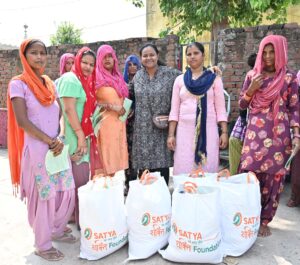- info@satyashaktifoundation.org
- Mon - Sat: 09.30 AM - 06:30 PM
Art as Culture and Catalyst for Social Change

Art & Culture has played a major role in designing and defining the communities across the world. Usually, the creative works aims to question, criticize, or modify the prevailing narratives, the status quo, or societal injustices are considered art for social change. Photography, film, music, theatre, poetry, graffiti, painting, sculpture etc and of course digital media are just a few of the numerous forms it can take. Listening to the people, talking about it, considering and acting on social issues that are important to people is the primary objective of art for social change.
Why is using art to promote social change important?
It has long been understood that art is a powerful tool for self-expression, cultural preservation, and aesthetic delight. It has the ability to greatly impact societal change and foster development is commonly disregarded, though.
An art has the capacity to challenge social norms irrespective of any particular place or group of people in the world which gives way to emotions, and therefore, start discussions about important associated topics. It serves as a catalyst for social change and thereby, expanding communities, and creating an ideal society that is more bent towards the equitable and inclusive behaviour.
Art actually unites the people from different backgrounds and also brings them closer. Art breaks down linguistic and cultural barriers by stimulating people’s deepest emotions and being accessible to everybody. Communities can feel a feeling of pride and ownership when abandoned places are revitalized and transformed into thriving creative hubs through public art displays, street performances, and community murals. Art projects become catalysts for social cooperation and group action when local artists and community people are involved in the development process.
Furthermore, art has a huge effect because it may question the current quo and give voice to those who are in a disadvantageous stage. Throughout history, artists have fearlessly tackled subjects such as racism, inequality, and injustice. Through bringing these urgent societal challenges to light, art provides a forum for discussion, empathy, and action.
Artistic expressions, whether in the form of writing, music, or paintings, regularly serve as social movement catalysts, encouraging people to challenge unfair practices and call for change. Through art, it is also possible to challenge assumed assumptions of tradition and redefine cultural identity. A growing worry in an increasingly globalized world is cultural homogeneity.
The difficulties and realities that societies encounter is reflected in art, which acts as a mirror. Artists often explore and critique political, social, and environmental issues through their work, bringing attention to topics that might otherwise go overlooked.
Through the critical lens of art, individuals are prompted to consider and discuss the world they live in. Art stimulates thought and motivates action on a variety of urgent concerns, from plays addressing mental health to photographic exhibitions recording social injustices.
Individuals are also transformed using art in education, especially children and young adults. Including art programs in schools and communities fosters creativity, problem-solving skills, and empathy. Through art education, students are encouraged to develop a sense of agency, to tolerate others, and to find their own identities.
It gives people the confidence to take on challenging social issues and gives them the tools to believe in their own ability to affect change.
The transforming power of art is undeniable. It can spark conversations, challenge social norms, and motivate action. via its ability to engage communities, elevate marginalized voices, redefine cultural identity, reflect societal issues, and empower individuals via education, art serves as a catalyst for social development and change. Art has the power to bring people together, heal, and build a more inclusive and equitable future in a world where inequality and division are pervasive. Recognizing and valuing art’s contribution to the advancement of social progress, diversity, and creativity in society is crucial.
Subscribe
Subscribe to our newsletter for the latest update.
Contact Us
- DPT 004, Ground Floor, DLF Prime Towers, Block- F, Okhla Phase-1, New Delhi- 110020 India
- +91-011 408 45450
- info@satyashaktifoundation.org
- Mon - Sat: 09.30 AM - 06:30 PM
-
© Copyright 2023 SATYA Shakti Foundation, All Rights Reserved. Developed By Kitoinfocom Pvt Ltd



Leave a Reply